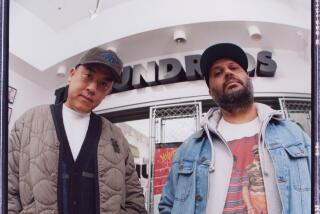Barney Josephson; Led Nightclub Integration
- Share via
Barney Josephson, the one-time shoe salesman and jazz aficionado credited with America’s first racially integrated nightclub, New York’s Cafe Society, died Thursday in a New York City hospital of internal bleeding.
The entrepreneur who in 1938 opened a club “where blacks and whites worked together behind the footlights and sat together out front,” was 86 and had closed his last musical establishment, The Cookery, in 1984.
Josephson, who could not play a note of music, was credited with launching the careers of such black artists as Billie Holliday, Hazel Scott, Lena Horne and Sarah Vaughan. Horne once said that Josephson not only gave her a career but self-respect; Holliday owed to Josephson one of her signature songs, “Strange Fruit,” the eerie anti-lynching ballad that the nightclub owner discovered and asked her to sing.
The son of Latvian Jewish immigrants who went to work in his oldest brother’s shoe store, he tired of the shoe business in the 1930s. By then several excursions to Harlem saloons, where blacks could perform but if admitted at all had to sit in the least desirable seats, had made him a jazz fan.
The segregation in the blacks’ own ghetto angered Josephson. “The only way they’d let Duke Ellington’s mother in was if she was playing in the band,” he recalled in a 1984 interview with Reuters news service.
Using borrowed money, Josephson started Cafe Society in a Greenwich Village basement room in 1938 and later branched out to Park Avenue. Until 1950, when politics intervened, he prospered.
Josephson’s brother, Leon, an avowed Communist, was held in contempt of Congress for refusing to testify before the House Committee on Un-American Activities. Barney Josephson’s clubs were blacklisted and, after losing $90,000, he closed them.
Josephson later opened The Cookery, where blues singer Alberta Hunter underwent a popular revival until she died in 1984. By then, Josephson said, he had grown weary of the club business and the prevalent musical styles, which were far removed from the Golden Age of jazz of which he had become an integral part.
More to Read
The biggest entertainment stories
Get our big stories about Hollywood, film, television, music, arts, culture and more right in your inbox as soon as they publish.
You may occasionally receive promotional content from the Los Angeles Times.










